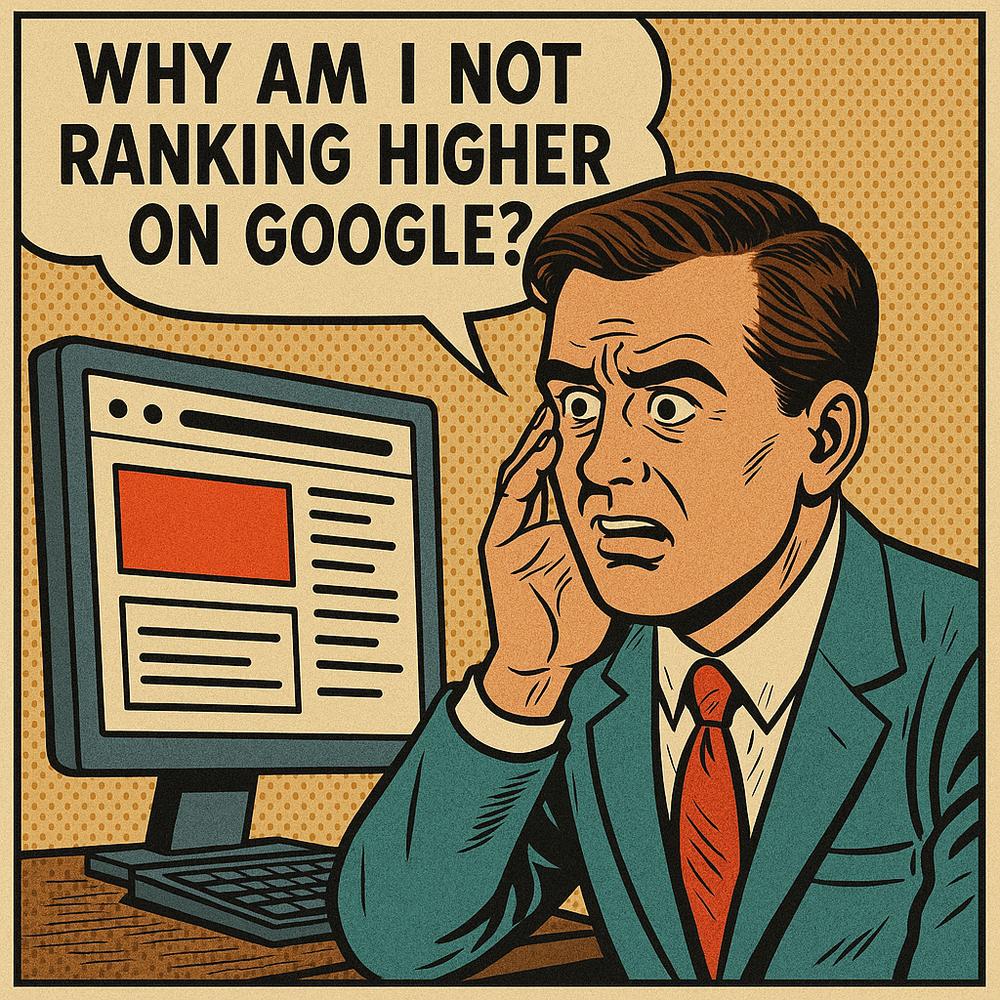
Why Am I Not Ranking Higher on Google?
Share
Within the whirlwind of internet sales, every business owner has asked themselves, "Why am I not ranking higher on Google?" It's a question that echoes through the halls of countless startups and established enterprises alike. The digital marketplace is vast, and standing out can feel like an insurmountable challenge. But understanding the reasons behind your site's ranking—or lack thereof—is the first step toward turning the tide in your favor.
At BlogCog, we specialize in helping businesses like yours navigate the complexities of SEO and content marketing. Our AI-Driven Blog Subscription service is designed to boost your online visibility and drive targeted traffic to your site. Let's explore some common reasons your website might not be ranking as high as you'd like—and how you can address them.
1. Your Site Isn't Indexed by Google
If Google can't find your website, it can't rank it. Ensure your site is indexed by checking Google's Search Console or using the site: operator in a Google search. If your pages aren't appearing, it might be due to settings that prevent indexing, such as a noindex tag or a robots.txt file blocking crawlers. Review your site's settings to make sure search engines can access and index your content.
2. Poor Content Optimization
Even if your content is high-quality, it needs to be optimized for search engines. This includes using relevant keywords, crafting compelling meta descriptions, and ensuring your content answers the questions your target audience is asking. Tools like BlogCog's Auto-Pilot Blog Creator can assist in generating SEO-friendly content that resonates with both readers and search engines.
3. Technical SEO Issues
Technical problems can hinder your site's performance and ranking. Issues like slow loading times, broken links, and mobile-unfriendly designs can negatively impact user experience and SEO. Regularly audit your site for technical issues and resolve them promptly to maintain optimal performance.
4. Lack of Quality Backlinks
Backlinks from reputable sites signal to Google that your content is valuable and trustworthy. Without a strong backlink profile, your site may struggle to rank well. Focus on building relationships with industry influencers, guest blogging, and creating shareable content to earn quality backlinks.
5. Not Meeting Search Intent
Google's algorithms prioritize content that best answers users' queries. If your content doesn't align with the search intent behind the keywords you're targeting, it may not rank well. Conduct thorough keyword research to understand what your audience is searching for and tailor your content to meet those needs.
6. Algorithmic Penalties
Engaging in practices like keyword stuffing, cloaking, or using low-quality backlinks can lead to penalties from Google, causing your site to drop in rankings. Ensure your SEO practices adhere to Google's guidelines to avoid penalties and maintain a healthy site reputation.
7. Low Domain Authority
Domain authority is a measure of your site's credibility and trustworthiness. New sites or those with few backlinks may have low domain authority, making it harder to rank. Focus on building quality content and earning backlinks to gradually increase your domain authority over time.
8. Not Utilizing Local SEO
If you're a local business, optimizing for local search is crucial. Claim and optimize your Google My Business listing, encourage customer reviews, and include location-specific keywords in your content to improve your visibility in local search results.
9. Outdated Content
Content that is outdated or no longer relevant can hurt your rankings. Regularly update your content to keep it fresh and aligned with current trends and information. This not only improves SEO but also provides value to your audience.
10. Not Using Structured Data
Structured data helps search engines understand the context of your content, potentially leading to enhanced search results like rich snippets. Implementing structured data can improve your visibility and click-through rates in search results.
Understanding the factors that influence your site's ranking is the first step toward improvement. By addressing these common issues and implementing effective strategies, you can enhance your site's visibility and performance in search results. At BlogCog, we're here to support you in your SEO journey. Explore our Why Blogs page to learn more about how consistent, high-quality blogging can drive traffic and improve your rankings.
Ready to take your SEO to the next level? Check out our Google & Bing Indexing service to ensure your content is properly indexed and discoverable by search engines.
Related Posts:
